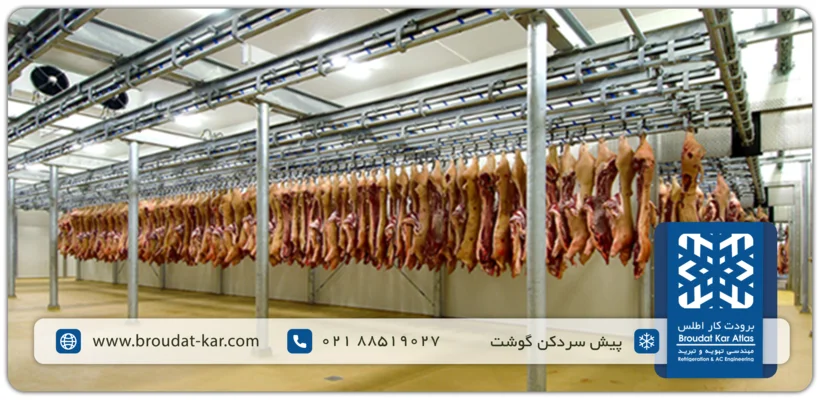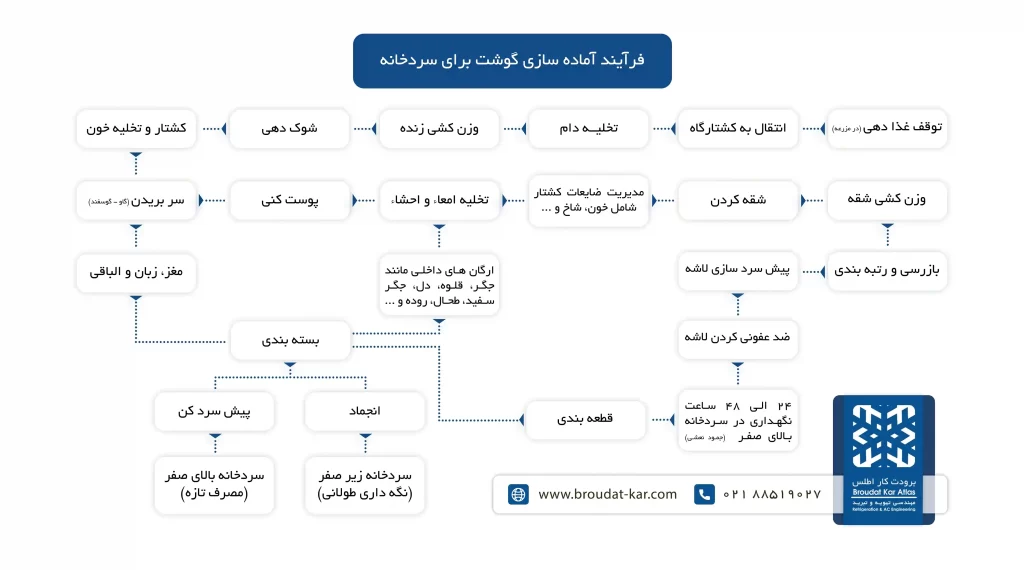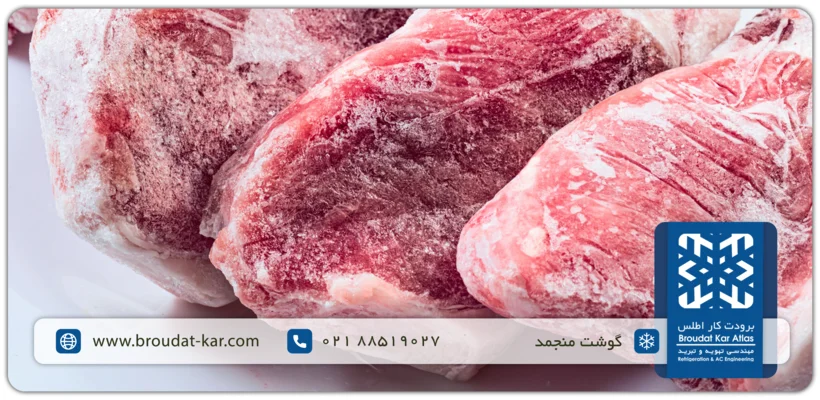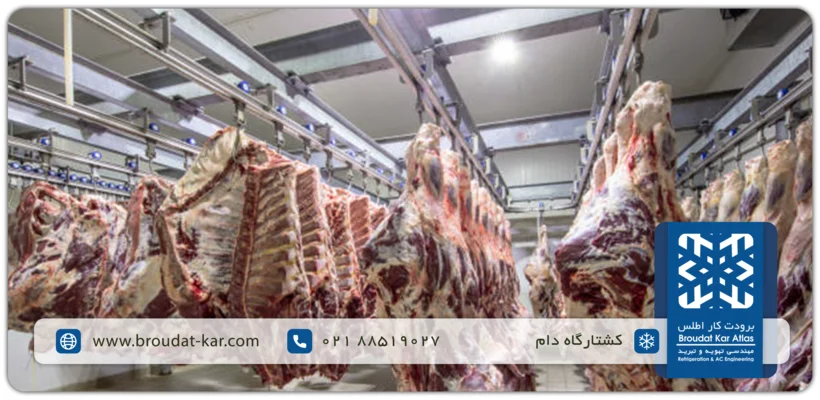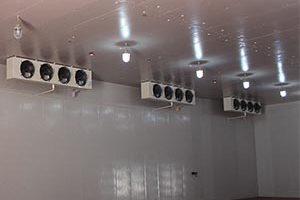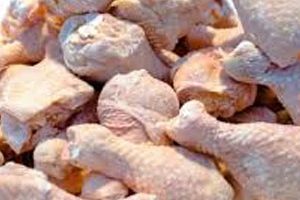What Is Meat Cold Storage?
Meat cold storage, also known as a meat refrigeration facility, is a specialized center dedicated to pre-cooling, freezing, and storing meat products while preserving their quality, freshness, and safety. Equipped with temperature-controlled spaces, advanced refrigeration systems, and specialized storage practices, these facilities ensure that meat is maintained in optimal conditions.
Types of Meat Cold Storage
Proper temperature management and principled storage are crucial for meat products due to their high perishability and susceptibility to bacterial growth, spoilage, and quality loss if not stored correctly.
Utilizing various industrial meat cold storage solutions, businesses in the meat industry can mitigate these risks and extend the shelf life of their products. The primary goal of meat cold storage is to safeguard the quality and safety of meat from the point of slaughter through transportation and delivery to the market and consumers. Different refrigeration processes with specific temperatures and specifications are essential for this purpose, including:
– Heat exchangers providing cold water at approximately 4-7 degrees Celsius for washing and cooling split carcasses (which typically have a temperature of 36 to 38 degrees Celsius) with a cold, hygienic water shower.
– Above-zero cold rooms for storing meat carcasses at +4 to +10 degrees Celsius for 24 hours after slaughtered.
– Primary meat pre-coolers with temperatures ranging from 0 to +4 degrees Celsius to lower the temperature of carcasses in preparation for freezing or cutting and packaging for fresh supply to the market.
– Secondary meat pre-coolers with temperatures between 0 and +4 degrees Celsius to reduce the temperature of cut and packaged meats and eliminate field heat.
– Meat blast freezers with temperatures of -35 to -40 degrees Celsius for freezing small carcasses or cut meat.
– Subzero cold storage for frozen meat, maintaining temperatures of -18 to -22 degrees Celsius for storage.
The role of meat cold storage is to uphold a low and consistent temperature, typically ranging from -18 degrees Celsius to +4 degrees Celsius, depending on the specific requirements of different meat products. This temperature range inhibits the growth of microorganisms that can lead to foodborne illnesses and spoilage, ensuring the health and safety of the meat.
In 1873, the first successful refrigerated meat shipment transported beef from Australia to the United Kingdom. The process used ice to maintain a temperature of -18°C revolutionizing food preservation and transport.
Advantages of Meat Cold Storage
Proper storage of meat products in industrial cold storage facilities offers numerous benefits. Firstly, it significantly extends the shelf life of meat, enabling producers, distributors, and retailers to store larger quantities of meat for extended periods without compromising quality. This capability facilitates better inventory management, waste reduction, and the ability to anticipate fluctuations in demand.
Moreover, maintaining the freshness and quality of meat through appropriate storage methods in cold storage enhances consumer satisfaction. Consumers expect meat products to be flavorful, tender, and devoid of any signs of spoilage. By preserving meat in industrial cold storage at the correct temperature, the texture, flavor, and nutritional value of the meat remain intact, ensuring that consumers receive a superior product.
The Global Meat Industry
Every day, an estimated 4 to 5 million four-legged animals, including cattle, sheep, pigs, buffaloes, goats, and deer, are slaughtered worldwide to meet the demand for red meat and its derivatives. While the majority of these animals undergo slaughter and processing in supervised slaughterhouses, a small percentage are still processed on farms.
Flowchart 1 illustrates the process of transforming live animals into packaged meat products. Meat cold storage and refrigeration facilities, such as pre-coolers or meat chilling rooms, freezing tunnels, and ice makers, play a vital role in preserving quality and extending the shelf life of meat products.
Maintaining proper hygiene practices is crucial at every stage of food processing, particularly in meat processing plants. Sanitation encompasses the upkeep of buildings, facilities, and equipment, regular cleaning, provision of sanitary water and washing facilities, proper waste and garbage disposal, insect and pest control, and appropriate utilization of disinfectants, germicides, and fungicides. All meat factories must adhere to regulations set forth by the Ministry of Health and Veterinary Organizations. Detailed sanitation guidelines for US federally inspected meat production can also be found in USDA Agricultural Handbook 570, the Food Safety and Inspection Service (FSIS), and Marriott guidelines from 1994.
Source: U.S. Department of Agriculture’s Agriculture Handbook 570, the Food Safety and Inspection Service (FSIS), and Marriott (1994).
Technical Specifications of Meat Cold Storage
The technical specifications of meat cold storage, akin to other cold storage facilities, necessitate specialized design and tailored assessment for each project. Consequently, a universal technical specification for industrial meat cold storage cannot be applied. For instance, the technical requirements of refrigeration devices for an industrial meat cold room with a 5-ton storage capacity vastly differ from those of a meat processing refrigeration complex. Below, we delve into the key technical aspects of meat cold storage and provide brief explanations for each.
Industrial-scale meat cold storage utilizes advanced ammonia refrigeration systems to maintain consistent temperatures of -18°C ensuring long-term freshness and safety.
Temperature Requirements and Control Systems
Industrial meat cold storage facilities require precise temperature control to uphold optimal storage conditions. Various types of meat and distinct supply processes to the market entail specific temperature conditions. For instance, fresh or warm meat destined for daily markets must be maintained at temperatures between 0 and 4 degrees Celsius throughout the journey from the slaughterhouse to the market. Additionally, frozen meat should be stored at -18 degrees Celsius.
Humidity Control
Humidity control within meat cold rooms is imperative to prevent either moisture loss or excessive moisture accumulation. Typically, the humidity level is regulated within a specific range, commonly falling between 85% and 95%. Humidity control systems, including humidifiers or dehumidifiers, are employed to sustain an optimal humidity balance within the cold storage. Preserving moisture control aids in averting meat from drying out or developing ice crystals, thereby safeguarding the texture, juiciness, and overall quality of the meat.
Air Circulation and Ventilation
Air circulation and effective ventilation within meat cold rooms are paramount to uphold a uniform temperature and prevent the formation of hot or cold spots. Meat cold storage facilities should facilitate the circulation of cold air throughout the cold room, taking into account the geometry of the space and utilizing fans. This practice ensures even distribution of the desired temperature, mitigating the risk of temperature fluctuations and maintaining consistent conditions for all stored meat products. Moreover, adequate air circulation aids in eliminating excess moisture and averting odors or contamination.
Insulation
Insulation plays a pivotal role in upholding the efficiency of meat cold storage. The walls, floor, and ceiling of the cold storage are constructed using insulating materials such as polyurethane foam or polystyrene, which minimize heat transfer and maintain a stable internal temperature. Proper insulation contributes to reduced energy consumption and prevents temperature fluctuations resulting from external factors. When selecting building materials, health requirements are also considered, ensuring they are easy to clean, resistant to moisture, and non-reactive with stored meat products.
By ensuring precise temperature control, humidity management, proper air circulation, and quality insulation, meat cold storage facilities create an ideal environment for storing meat products. These technical features are instrumental in preserving the quality, safety, and shelf life of meat, enabling businesses to deliver superior products to their customers.
Meat Freezing and Storage Temperature
Maintaining precise temperature control for both freezing meat and storing meat products is crucial to uphold their quality, safety, and prolonged shelf life. The table below offers an outline of the recommended temperature ranges for freezing and storing various types of meat. It’s essential to recognize that these ranges serve as general guidelines, and specific temperature conditions may fluctuate based on factors like meat type, packaging, and regulatory standards. Always refer to specific product instructions and regulatory guidelines for precise temperature recommendations.
Meat Freezing and Storage Temperature
| Row | Meat Type | Freezing Temperature (°C) | Storage Temperature (°C) |
| 1 | Beef | ranging from -40 to -30 °C | ranging from -20 to -18 °C |
| 2 | Pork | ranging from -40 to -30 °C | ranging from -20 to -18 °C |
| 3 | Lamb | ranging from -40 to -30 °C | ranging from -20 to -18 °C |
These temperature ranges serve as general recommendations and may vary depending on specific product requirements and regulations. It is advisable to consult regulatory guidelines and seek professional advice to determine the most suitable temperature range for your specific meat products and storage conditions.
Application of Blast Freezers in Meat Processing
The utilization of blast freezers in the meat production and processing industry is indispensable. Freezing meat plays a pivotal role in maintaining the quality, safety, and freshness of meat products. Blast freezers are specifically engineered to swiftly freeze meat by subjecting it to air at temperatures around -40 degrees Celsius and at high speeds. This rapid freezing process minimizes the formation of large ice crystals on meat products, consequently reducing cell damage and moisture loss during freezing. The meat freezing tunnel preserves the natural texture, flavor, and nutritional value of the product by rapidly freezing the meat. Moreover, it aids in preserving the appearance of the meat by preventing discoloration and burning.
Meat Cold Storage Pricing
The cost of meat cold storage can fluctuate based on several factors, including the size of the facility, its geographic location, required customization levels, specific technical features and equipment, and the overall project complexity. It’s crucial to engage with a reputable and experienced company capable of conducting a thorough assessment of your unique requirements and offering a competitive and transparent pricing structure. While the initial investment in industrial meat cold storage may vary, it should be viewed as a long-term investment ensuring the quality, safety, and extended shelf life of your meat products. Ultimately, this investment can contribute to the success and profitability of your business.
Feel free to reach out to us for a tailored assessment and pricing calculation for industrial-scale meat cold storage solutions.
Atlas Refrigeration: Expert Meat Cold Storage Solutions
At Atlas Refrigeration Company, we specialize in designing and constructing meat cold storage facilities with advanced technical features tailored to meet our customers’ specific needs and ensure optimal storage conditions for their meat products.
Design and Construction of Meat Cold Storage
We offer comprehensive services for the design and construction of meat cold rooms, customized to your precise requirements. Our experienced team collaborates closely with you to understand your business needs, freezing and storage capacity, temperature requirements, and other specifications. Utilizing cutting-edge technologies and industry best practices, we design and build efficient and reliable meat freezing and storage plants that maximize space utilization, ensure precise temperature control, and comply with regulatory standards.
After-Sales Service, Maintenance, and Repairs
To maintain uninterrupted operation of your industrial meat cold storage, we provide comprehensive maintenance and repair services. Our skilled technicians conduct regular inspections, preventive maintenance, and troubleshooting to identify and resolve potential issues promptly. We offer fast and efficient repairs to address mechanical or electrical problems, minimize downtime, and prevent costly disruptions to your operations. With a 15-year system and after-sales service warranty period, we aim to keep your meat cold storage in optimal working condition, preserving the quality and safety of your stored products.
Energy Efficiency Solutions
In today’s environmentally conscious world, energy efficiency is paramount. Our team specializes in delivering energy-saving solutions for meat cold storage. By employing advanced technologies such as energy-efficient refrigeration systems, intelligent controls, and insulation upgrades, we help optimize energy consumption while maintaining required temperature conditions. Our energy efficiency solutions not only reduce operating costs but also contribute to sustainability efforts by minimizing carbon footprints and conserving resources.
At Atlas Refrigeration Company, we are dedicated to delivering high-quality services. Our objective is to ensure that our industrial meat cold storage performs optimally, providing ideal storage conditions for your meat products and supporting the success of your business.
Meat Cold Storage Conclusion
In the meat industry, maintaining optimal storage conditions is crucial for preserving the quality and safety of products. We recognize the significance of this responsibility and offer a range of comprehensive services to meet your needs.
From designing efficient storage spaces to providing ongoing maintenance and energy-saving solutions, our team is dedicated to supporting your cold storage operation. Investing in our industrial meat cold storage solutions allows you to meet regulatory requirements, minimize waste, and consistently deliver exceptional products.
Contact us today to discover how our services can enhance your cold storage capabilities.
Carcasses should be moved into the cold room immediately after pre-cooling to prevent sudden temperature shocks that may cause muscle contraction and reduce quality.
Accurately recording entry dates, weights, and batch details ensures proper inventory management and supports FEFO (First Expired, First Out) practices.
Rapid freezing forms small ice crystals that do not damage the tissue, while slow freezing produces larger crystals that disrupt the meat’s structure.
Separating loading and unloading routes, using dedicated handling equipment, and regularly disinfecting floors and walls are essential.
Both are necessary. Low humidity dries out the surface of the meat, while high humidity leads to unwanted surface icing.
Digital monitoring systems with automatic logging of temperature and humidity, plus real-time alerts, ensure consistent conditions.
Related posts
Meat Cold Storage
Portable Cold Store; Design and Construction of Portable Cold Store + Price The portable cold room, also known as
What is dairy cold storage? Dairy cold storage stands as a pivotal element within the dairy industry, crucial for the
What Is Chicken Cold Storage? Chicken cold storage refers to specialized equipment designed for preserving poultry products like chicken
Fish and Shrimp Cold Storage Systems – Preserving Freshness Fish and shrimp cold storage facilities play an important role in
What is Fruit Cold Storage? A Fruit cold storage is a specialized facility designed to store fruits and vegetables

